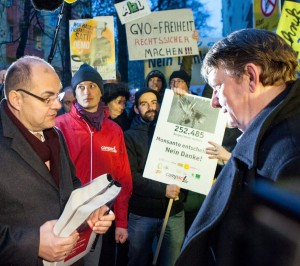
Governments and European Parliament agreed on a slippery way of banning GMO cultivation. Better than nothing.
After 24 hours of negotiations between the European Parliament, the Council of Ministers and the European Commission the institutions agreed on a compromise deal on national bans of GMO cultivation. Genetically modified plants, approved for cultivation by the EU can still be banned by national governments, if the provisional agreement is approved by the Parliament and the Council in January 2015.
The ministers had proposed a UK inspired agreement that would have required governments to first seek voluntary exemption of their territory from the GMO application and only allow a ban if companies like Monsanto and Bayer would not agree with that proposal. Meanwhile Parliament had proposed full sovereignty of the decisions. The compromise now invites governments to negotiate with the GM companies but does not make such bargaining a prerequisite for national bans. The Parliament’s proposal to base such bans on the EU environmental legislation, allowing for precautionary action and shielding the decisions from legal challenges was not included in the compromise. As national bans would now have to be enacted under the EU common market rules, they are believed to be more vulnerable to claims of market discrimination. These concerns are exacerbated by the provision that the list of allowable justifications of GMO bans explicitly excludes all those aspects the EU’s notorious pro-GMO Food-Safety-Agency (EFSA) already examined.
Frédérique Ries (ALDE, BE) who is steering the legislation through Parliament said the compromise gave more flexibility to Member States and that it will “signpost a debate which is far from over between pro- and anti-GMO positions.” She added: “As to what comes next, I place my trust in Commission President Jean-Claude Juncker’s formal pledge to strengthen the democratic process on GMOs in Europe and ensure that research is genuinely independent”.
The new Health Commissioner in charge, Vytenis Andriukaitis welcomed the agreement as it would “give Member States the possibility to restrict or prohibit the cultivation of GMOs on their territory, without affecting the EU risk assessment”. He added that “the text agreed is in line with President Juncker’s commitment, as reflected in his Political Guidelines, to give the democratically elected governments at least the same weight as scientific advice when it comes to important decisions concerning food and environment”.
Environmental NGOs called the compromise weak and Greenpeace deplored that evidence of environmental harm may not be used to justify a ban.
The Greens claimed that “this deal has avoided the worst but leaves too many gaps.” The GMO industries’ lobby Europa-Bio spoke of a “non cultivation agreement”.
A coalition of German anti-GMO and citizens rights organisations handed over more than 250,000 signatures, collected in less than one week demanding a “real GMO ban” option. They are now urging Germany’s Minister for Agriculture and Food, Christian Schmidt to particularly block any direct or indirect influence of GM industries in the process. Schmidt, whose Bavarian Christian Democrats (CS) vow to keep Bavaria GMO free, promised he would be looking after strong national implementation of the EU compromise. “I will ensure that it is the minister and not the M. company who controls the process”, he told demonstrators who met him early Friday morning at his favorite bakery in Berlin.
However, anti-GMO activists are unhappy in particular with the legal basis of the directive, that would prevent Member States from precautionary protection of the environment and their citizens’ health as justification of GMO cultivation bans. “Leaving the governments with vague grounds for their measures, jeopardizes their decisions with legal challenges as well as threats in arbitration bodies of the WTO and bilateral trade agreements,” warned their spokesperson, Benny Haerlin of “Save Our Seeds”.





